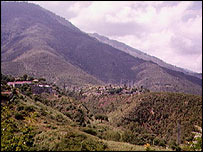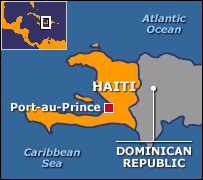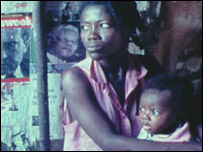| Want to send this page or a link to a friend? Click on mail at the top of this window. |
| Posted December 6, 2003 |
| Haiti's 200 years of wasted hopes |
| By John Pickford BBC correspondent, Haiti |
It is 200 years since Haiti won independence from France. What happened to the rich promises of the tropical island? "The trees laden with fruit, the plants tall and in flower, and the air as sweet as April in Spain."
December 1492 and Columbus has made his first landfall in the north-eastern tip of what is now Haiti.
He is deeply impressed. Here, he writes in his journal, is "everything a man could want in this world."
The site of that first landfall still carries the name Columbus gave it: San Nicholas.
But today, San Nicholas is the poorest of Haiti's nine administrative districts. This makes it the poorest province in the poorest country in the western hemisphere.
In 2003 nothing can quite prepare you for your first visit to this beleaguered country.
| "I watched, barefoot pedestrians picking their way through puddles of sewer water" |
I arrived in the capital, Port-au-Prince, on a Sunday after a thunderstorm.
In a region swirling with tourists, just two other people got off the plane.
Twenty minutes later on the edge of the city centre, I watched barefoot pedestrians picking their way through puddles of sewer water, while gaping holes in the streets disgorged the contents of the drains.
But Haiti can spring surprises, good and bad.
| Celebration |
That night I watched a spectacular firework display from the balcony of my hotel and met, by chance, the Frenchman who had staged it.
He told me he'd been flown in specially from Paris to organise this show for the hero of the 1803 Haitian revolution, Toussaint L'Ouverture.
 |
 |
 |
||||
| Once rich, Haiti is the poorest country in the region | Haiti has a population of 8.3 million | Average life expectancy is 50 years for men and 49 years for women |
In this special year for Haiti, the commemorations have come thick and fast, for Toussaint's death and the final defeat of the French.
The French were defeated by an army of ex-slaves at the battle of Vertieres, resulting in the triumphant proclamation of Haitian independence on 1 January 1804.
Haitians will never tire of telling you that this is the second oldest independent country in the New World and the first plantation colony to stage a successful slave revolt.
They claim with pride and insistence that theirs was the first completely free country in the Americas.
They point out it was another 60 years before slavery was abolished in the United States.
| Hard times |
The rhetoric rings hollow today when you find yourself talking, as I did, to a peasant woman bent double planting vegetables on a steeply sloping hillside some two hours drive out of Port-au-Prince.
She told me she earns less than a dollar a day for this work and doesn't even own the primitive tool she is using, which is a sort of machete.
She had to borrow it from the person she is working for.
Tomorrow she will have to try to find a different job to help her family survive.
Average life expectancy is 50 years for men and 49 years for women
Something has gone horribly wrong in Haiti since Columbus was so intoxicated by the place.
When you probe a bit into the country's past, you sense it all started a long time ago.
The delinquent dictatorships that failed the people of Haiti in the 20th century were symptoms of a deep-seated malaise rather than the start of the country's problems.
The honour of being the first black republic in the New World wasn't an easy beginning.
Haiti found itself ostracised and isolated by the surrounding colonies, fearful of its example, while the French insisted on reparations (as the price of independence) that were so onerous they took 40 years to pay off.
Talking with one of Haiti's most gifted - and opinionated - historians, Georges Michel, another telling phrase came up: "predatory government".
| Origins of greed |
This was a tradition that began 500 years ago with Columbus and his lust for gold.
It continued under French colonial rule in the 18th century, when Haiti's plantation economy became the most lucrative in the Caribbean.
Tragically it began all over again in the 19th and 20th centuries. The African slaves, who had fought so courageously for their freedom, reverted to those same predatory instincts when they began to rule themselves.
The result has been a long succession of governments more interested in holding on to power and what they can get from the country, rather than running an efficient administration.
Today in Haiti the cupboard is bare.
|
||||
|
||||
|
||||
|
||||
|
||||
|
Half the population is malnourished.
It has been said that Haitians lack everything but imagination.
So when you ask people about their current president, many will shrug their shoulders fatalistically.
They say that Mr Aristide, the ascetic former priest who won power on such high hopes, is now richer, fatter, and married. According to them, this is all you can expect from a Haitian president.
The day I left the country, the airport was even emptier than when I arrived.
In the departure lounge I got into conversation with a young woman promoting free samples of a local fruit juice, though it looked more like coloured water.
"Not many passengers," I said. "No," she replied in excellent French, "it's because of the political situation."
You sense they have been saying that in Haiti for at least 200 years.
From Our Own Correspondent was broadcast on Saturday, 6 December, 2003, at 1130 GMT on BBC Radio 4. Please check the programme schedules for World Service transmission times.
Reprinted from The BBC, World Service, of December 6, 2003.
See also: Haiti: 'The world doesn't have any idea how bad this situation is getting' / In Haiti, thanks to about $1 narco-billion and pillage of the public treasury only a murderous, delinquent dictator and partners in crime leave the good life / Aristide's populist appeal dwindles in Haiti
| Wehaitians.com, the scholarly journal of democracy and human rights |
| More from wehaitians.com |